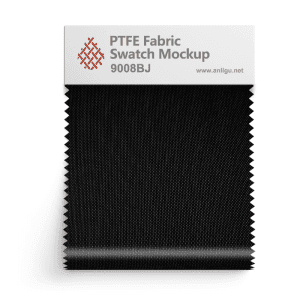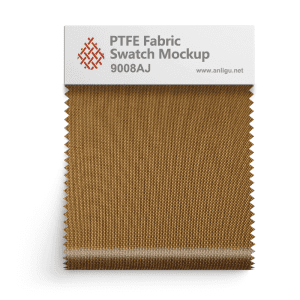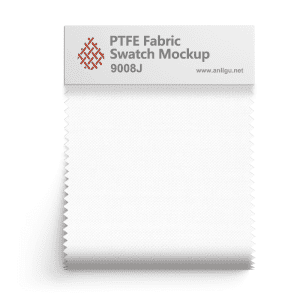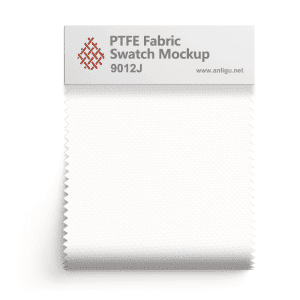Key Features & Performance of Thermal insulation fabric
1.Stable dimension, high intensity, elongation coefficient less 5%.
2.Good temperature resistance, 24 hours working temperature -70~260℃.
3.Low coefficient of friction and dielectric constant, high insulation property.
4.Non-stick, easy to clean stains and adhesive on the surface.
5.Good chemical resistance, it can resist almost all of chemical, acids, alkalis, and salt, it is fireproof, ageing resistance.
PTFE Coated Fiberglass FAbric 9030AJ
| Item NO. | 9030AJ |
|---|
| Color颜色 | brown |
厚度
Thickness
(mm)±5% | 0.28 |
基布克重
Base Fabric Weight
(g/m²)±3% | 255 |
成品克重
Total Weight
(g/m²)±5% | 580 |
抗拉强度
(N/5cm)≥Warp | 2400 |
抗拉强度
(N/5cm)≥Weft | 1700 |
撕裂强度
(N/5cm)≥Warp | 35 |
撕裂强度
(N/5cm)≥Warp | 30 |
PTFE-coated fabric can withstand continuous operating temperatures up to 260°C (500°F) and short-term peaks up to 300°C (572°F). It remains dimensionally stable and does not degrade under extreme thermal conditions.
PTFE is chemically inert to nearly all acids, alkalis, solvents, and corrosive gases. It does not react with aggressive chemicals, making it ideal for applications in the chemical, petroleum, and pharmaceutical industries.
The low surface energy of PTFE creates an ultra-smooth, non-stick surface, preventing adhesion of food, adhesives, resins, inks, and other sticky substances. This simplifies cleaning and reduces downtime in industrial processes.
When reinforced with fiberglass, aramid, or Kevlar, PTFE fabric exhibits high tensile strength, tear resistance, and durability. It performs well under mechanical stress, even in continuous production environments.
PTFE-coated fabric offers excellent dielectric strength and electrical insulation, making it suitable for high-voltage insulation, heating elements, and electronic manufacturing processes.
PTFE is hydrophobic (water-repellent) and resistant to steam and moisture. It does not absorb water, making it suitable for humid or wet environments, including food processing and packaging.
PTFE fabrics are resistant to UV radiation, oxidation, and weathering. Many grades are flame-retardant (UL 94 V-0), making them suitable for outdoor use and environments with fire safety requirements.
PTFE fabric maintains its shape, thickness, and strength across a wide range of temperatures and loading conditions. It exhibits minimal shrinkage, expansion, or warping.
Due to its anti-stick, thermal, and chemical properties, PTFE fabric can be reused for thousands of cycles without significant wear. It offers excellent cost-effectiveness in long-term applications.
PTFE high temperature fabrics can be customized in:
- Thicknesses: 0.07 mm – 0.98 mm
- Widths: up to 4000 mm
- Surface finishes: smooth, textured, or anti-static
- Backings: adhesive, silicone, or aluminum
- Reinforcements: fiberglass, mesh, or multi-layer composite
Need Expert Advice or a Custom Solution?
Our technical sales team is here to help you choose the right PTFE product for your application.
Contact Anligu today:
Email: info@anligu.net
Website: www.anligu.net
WhatsApp: +86 18118100011
Address: Taizhou City, Jiangsu Province, China
Request samples, inquire about custom specs— we’re ready to support your business.
- Trusted in over 30 countries
- ISO-compliant production
- Fast response & professional service








